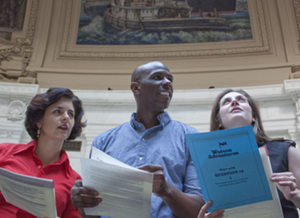 One of our all-time best hunters is not who you might expect. On a recent Race to the White House Scavenger Hunt, one team blew the competition out of the water. The team operated more smoothly and found the correct answers more quickly than any we had witnessed in a long time. Why did they succeed so smashingly? A blind teammate had taken charge.
One of our all-time best hunters is not who you might expect. On a recent Race to the White House Scavenger Hunt, one team blew the competition out of the water. The team operated more smoothly and found the correct answers more quickly than any we had witnessed in a long time. Why did they succeed so smashingly? A blind teammate had taken charge.
How did a blind person lead a team of colleagues through a corporate scavenger hunt with questions whose answers rely almost entirely on sight? The secret to their success lies in the ways different hunters perform—specifically, whether they’re readers or listeners. Read on to let Peter Drucker, “the father of modern management,” explain what we mean.
How Do You Perform?
To find success in anything you do, you need to know your strengths. In his classic Harvard Business Review piece “Managing Oneself,” Drucker says understanding your strengths lies partly in understanding how you perform.
“Amazingly few people know how they get things done,” he writes. “Indeed, most of us do not even know that different people work and perform differently.”
Drucker’s most important distinction is whether you’re a reader, or a listener. People rarely do both, he says, and their inclination determines a lot about how they perform in countless situations. Dwight Eisenhower, for example, was a consummate reader; he excelled in situations where he could read a prepared statement, but he flopped without a script. Lyndon Johnson, on the other hand, lived to listen; he had a sharp mind and a quick tongue, but he was hopeless reading off a piece of paper.
“Few listeners,” Drucker writes, “can be made, or can make themselves, into competent readers—and vice versa.”
Readers & Listeners on the Hunt
We see Drucker’s distinction play out in scavenger hunts every day. Some hunters work by reading off their clue sheet at all times, while others prefer to hear the clues read aloud and absorb them that way. On hunts that integrate our smartphone app, some players want to follow along on their phones, and others simply listen. If everyone recognizes their strengths and those of their teammates, they can work like a well-oiled machine.
Therein lay the success of the group we mentioned earlier. The blind teammate couldn’t see the sculptures or landmarks in question, but she was comfortable with her strengths, and those of her teammates, and she helped lead them to victory.
Now that’s what we call team building.
Contact us for more information on our array of corporate scavenger hunts, which are customizable, affordable, and available everywhere.